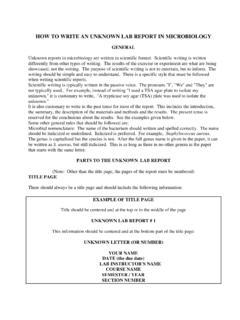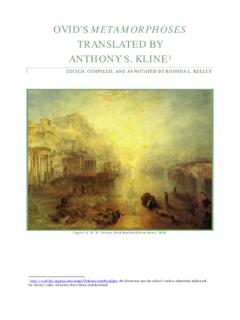Transcription of THE AENEID BY VIRGIL TRANSLATED BY JOHN DRYDEN
1 THE AENEID BY VIRGIL TRANSLATED BY JOHN DRYDEN Edited, Annotated, and Compiled by Rhonda L. Kelley All pictures are from Wikimedia Commons, unless otherwise annotated. FIGURE 1 VIRGIL READING THE AENEID TO AUGUSTUS AND OCTAVIA, JEAN-JOSEPH TAILLASSON, 17871 1 Octavia faints as VIRGIL reads a portion of Book VI describing the young and tragic Marcellus, Octavia s recently deceased son. TABLE OF CONTENTS Table of Contents .. 2 BOOK I: ARMS AND THE MAN .. 3 BOOK II: THE FALL OF 22 BOOK III: AENEAS WANDERINGS .. 44 Summary .. 44 BOOK IV: THE PASSION OF DIDO .. 47 BOOK V: FUNERAL GAMES .. 67 Summary .. 67 BOOK VI: The 71 BOOK VII: A BETROTHAL AND A DECLARATION OF WAR.
2 95 Summary .. 95 BOOK VIII: EVANDER AND AENEAS NEW ARMOR .. 97 Summary and Excerpt .. 97 Shield of Aeneas .. 98 BOOK IX: Turnus Attacks .. 102 Summary and Excerpt .. 102 Nisus and 103 BOOK X: War Rages On .. 112 Summary and Excerpts .. 112 The Youthful Pallas and Lausus .. 113 Death of Pallas .. 113 Death of Lausus .. 115 BOOK XI: The Trojans Advance .. 117 Summary .. 117 BOOK XII: Turnus Vs. Aeneas .. 119 SummAry and Excerpt .. 119 Aeneas Kills Turnus .. 120 BOOK I: ARMS AND THE MAN FIGURE 2 THE FEAST OF DIDO AND AENEAS, FRANCOIS DE TROY, 1704 Arms, and the man I sing,2 who, forc'd by fate, And haughty Juno's3 unrelenting hate, Expell'd and exil'd, left the Trojan shore.
3 4 Long labors, both by sea and land, he bore, And in the doubtful war, before he won The Latian5 realm, and built the destin'd town; 6 His banish'd gods restor'd to rites divine, And settled sure succession in his line,7 From whence the race of Alban8 fathers come, And the long glories of majestic Rome. O Muse! the causes and the crimes relate; 2 Arma virumque cano (Latin), the famous first words of the AENEID . 3 Hera (Greek); Queen of the gods who hates the Trojans. 4 At the Fall of Troy (1184 BC). 5 Latium 6 Rome 7 Aeneas is the legendary ancestor of the Julio-Claudians, the clan to which Julius Caesar and Caesar Augustus belong.
4 8 Alba Longa, an ancient Italian city from which legendary Roman founder Romulus came. What goddess was provok'd, and whence her hate; For what offense the Queen of Heav'n began To persecute so brave, so just a man; Involv'd his anxious life in endless cares, Expos'd to wants, and hurried into wars! Can heav'nly minds such high resentment show, Or exercise their spite in human woe? Against the Tiber's9 mouth, but far away, An ancient town was seated on the sea; A Tyrian10 colony; the people made Stout for the war, and studious of their trade: Carthage the name; belov'd by Juno more Than her own Argos, or the Samian shore. Here stood her chariot; here, if Heav'n were kind, The seat of awful empire she design'd.
5 Yet she had heard an ancient rumor fly, (Long cited by the people of the sky,) That times to come should see the Trojan race Her Carthage ruin, and her tow'rs deface; 11 Nor thus confin'd, the yoke of sov'reign sway Should on the necks of all the nations lay. She ponder'd this, and fear'd it was in fate; Nor could forget the war she wag'd of late12 For conqu'ring Greece against the Trojan state. Besides, long causes working in her mind, And secret seeds of envy, lay behind; Deep graven in her heart the doom remain'd Of partial Paris, and her form disdain'd;13 The grace bestow'd on ravish'd Ganymed,14 Electra's glories,15 and her injur'd bed. Each was a cause alone; and all combin'd To kindle vengeance in her haughty mind.
6 For this, far distant from the Latian coast16 She drove the remnants of the Trojan host; And sev'n long years th' unhappy wand'ring train Were toss'd by storms, and scatter'd thro' the main. Such time, such toil, requir'd the Roman name, Such length of labor for so vast a frame. Now scarce the Trojan fleet, with sails and oars, Had left behind the fair Sicilian shores, Ent'ring with cheerful shouts the wat'ry reign, And plowing frothy furrows in the main; When, lab'ring still with endless discontent, The Queen of Heav'n did thus her fury vent: "Then am I vanquish'd? must I yield?" said she, "And must the Trojans reign in Italy? So Fate will have it, and Jove adds his force; 9 The Italian River on whose eastern bank Rome was founded in 753 BC.
7 10 A Phoenician city; ruled by Dido s brother Pygmalion. The Tyrians established Carthage to flee Pygmalion s tyranny. 11 The Romans (descended from the Trojans) would raze Carthage at the end of the 3rd Punic War (146 BC). 12 The Trojan War 13 See The Judgement of Paris; Paris chose Venus over Juno and Minerva in a high stakes beauty contest. 14 A young (as in, child) Trojan prince, kidnapped and ravished by Jove. Unlike Jove s other rape victims, Ganymede was kept by the king of the gods as his personal cup-bearer. 15 Electra is not mentioned in the Latin text. 16 Latium; the region in which Rome was eventually founded(and so Aeneas goal) and home to the Latins, an indigenous tribe.
8 Nor can my pow'r divert their happy course. Could angry Pallas,17 with revengeful spleen, The Grecian navy burn, and drown the men? She, for the fault of one offending foe,18 The bolts of Jove himself presum'd to throw: With whirlwinds from beneath she toss'd the ship, And bare expos'd the bosom of the deep; Then, as an eagle gripes the trembling game, The wretch, yet hissing with her father's flame, She strongly seiz'd, and with a burning wound Transfix'd, and naked, on a rock she bound. But I, who walk in awful state above, The majesty of heav'n, the sister wife of Jove, For length of years my fruitless force employ Against the thin remains of ruin'd Troy!
9 What nations now to Juno's pow'r will pray, Or off'rings on my slighted altars lay?" Thus rag'd the goddess; 34-80 As the Trojans are sailing from Sicily on the last stage of their voyage to Italy Juno intervenes to stop them. She goes to Aeolus, king of the winds, and urges him to stir up a storm and wreck the Trojans. He agrees to do so. 81-123 Aeolus causes the storm to begin; Aeneas is panic-stricken, and prays for death. The ships are buffeted, and that of Orontes sinks. 124-156 Neptune intervenes, angrily rebukes the winds, and calms the storm. The weary Trojans ply their shatter'd oars To nearest land, and make the Libyan Within a long recess there lies a bay: An island shades it from the rolling sea, And forms a port secure for ships to ride; Broke by the jutting land, on either side, In double streams the briny waters glide.
10 Betwixt two rows of rocks a sylvan scene20 Appears above, and groves for ever green: A grot is form'd beneath, with mossy seats, To rest the Nereids,21 and exclude the heats. Down thro' the crannies of the living walls The crystal streams descend in murm'ring falls: No haulsers need to bind the vessels here, Nor bearded anchors; for no storms they fear. Sev'n ships within this happy harbor meet, The thin remainders of the scatter'd fleet. The Trojans, worn with toils, and spent with woes, Leap on the welcome land, and seek their wish'd repose. First, good Achates22, with repeated strokes Of clashing flints, their hidden fire provokes: 17 Pallas Athena, aka Minerva, is the other goddess rejected by Paris in the beauty contest; Minerva, thus, hates the Trojans as much as Juno.











